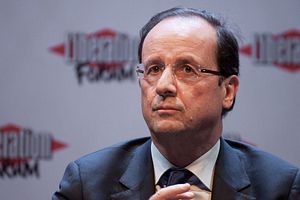French President Francois Hollande is paying a state visit to Vietnam from September 5 to 7. This represents a good omen for future exchanges between the two countries. The emphasis will be officially put on cultural cooperation and the reinforcement of links between Paris and Hanoi. However, the Vietnamese are expecting a lot from this visit, especially since French Defense Minister Jean-Yves Le Drian gave a speech mentioning joint EU patrols of “the maritime areas of Asia” at the Shangri-La Dialogue in Singapore last June.
According to the French ambassador to Vietnam, Hollande’s visit to Vietnam (the third by a French president since the early 1990s and the advent of the Doi Moi reform policy) aims at encouraging environmental protection measures. Furthermore, France will help Vietnam to better manage air quality by building an air quality measurement system. However, another area will be of particular interest: it is likely that Hollande and Vietnamese President Tran Dai Quang will examine how to strengthen the strategic partnership that the two countries signed in 2013.
It is in the interest of Vietnam to develop economic ties with this European power; likewise, Paris cares a lot about its economic interests in Southeast Asia. A report by the French Senate in 2014 (No. 723) gave high priority to exchanges with Southeast Asian countries and especially with Vietnam. Today, 300,000 Vietnamese people are living and studying in France. France is the second largest historical bilateral donor for Vietnam, just behind Japan, with $1.7 billion in cumulative aid since 1993. French exports to Vietnam were worth $858 million in 2014 and rose to $1.57 billion in 2015. There are 300 French firms operating in Vietnam, providing 26 000 jobs. With Hollande’s visit, economic and financial ties will be strengthened with 20 new bilateral measures to facilitate trades between these two partners.
But apart from these exchanges, the most important part of the discussions will focus on defense cooperation, which was also part of the 2013 strategic partnership agreement.
France has the second largest maritime domain in the world and its “Sovereignty Forces,” with 72 combat and support ships, have a long experience in warm seas. Freedom of navigation is a subject dear to France because of its overseas territories. Even if the French overseas territories are mainly in the Pacific Ocean their interest in Southeast Asia is growing each year. In the last decade, France lost considerable ground in Africa; it now needs to reposition itself in Asia.
By this visit to an historical old partner, Hollande will not only boost economic but also military ties. The timing could not have been any better; Vietnam is actually in the market for fighter jets and a more advanced missile system. After the massive leak scandal involving French submarine builder DCNS, it is necessary for the French to send a positive image in terms of their reliability and seriousness in defense cooperation. And it is also time to work out a policy to compete with the Asian superpowers. The end of the U.S. lethal arms embargo on Vietnam made Hanoi a potential good customer for French armament manufacturers. But the competition is severe with Asian suppliers, not mention Russians or Americans. The $500 million defense credit India just offered to Vietnam for defense cooperation, combined with military deals Hanoi has signed with Tokyo, will make it very difficult for the French delegation.
On the Vietnamese side, the “rapprochement” between China and Cambodia does not augur well for its future geopolitical stability. With China’s maritime militia active in the South China Sea despite a ruling from the Permanent Court of Arbitration denying China’s “historic rights” in the waters, it seems that China already has the power to slow down Vietnamese maritime activities. Combined with a bad relationship with Vietnam’s closest neighbor and ally on land, this would be the worst-case scenario for Vietnam. More than ever, Hanoi needs to upgrade exchanges with a European partner.
France is the most likely bet in this regard as well. Paris prepared its “pivot” to Southeast Asia starting in 2013. After French navy frigate Georges Leygues visited Ho Chi Minh City, another frigate, the Vendemiaire, visited Da Nang and last May, the amphibious assault ship Tonnerre docked at Cam Ranh international port, evidence enough that the French are back in the South China Sea. Hollande’s visit will seek to strengthen this strategic cooperation as well.
Dr. Quoc-Thanh Nguyen is an associate member at IrAsia, the National Center for Scientific Research (CNRS), Aix-Marseille University.

































